Journal Boards
On Behalf of Dokuz Eylül University Faculty of Letters, Department of Archaeology, Owner
Chief editor

Professor Ergün Laflı is a classical archaeologist at the Dokuz Eylül University in Izmir, chairs the Division for Medieval Archaeology and is the founding director of the Center of the Archaeology of Western Anatolia (EKVAM). He was born in 1975 in Mersin, Turkey. He attended to the Sainte-Pulchérie French School in Istanbul and Tarsus American College, both in Turkey. He holds a B.A. degree from the University of Ankara (1996), a M.A. from the University of Tübingen (1999) and a Ph.D. from the University of Cologne (2003), all in classical archaeology. Since 2006 he edited or co-authored seven books on Hellenistic, Roman and Early Byzantine terracottas, ceramics, metal figurines, glass finds and inscriptions from Asia Minor. Between 2005 and 2009 he directed an archaeological field project in Hadrianopolis, a Roman and Early Byzantine site in north-central Turkey and the main focus of this book. He organized numerous archaeological congresses in Izmir and published various material groups from Classical Anatolia.
Editorial Committee
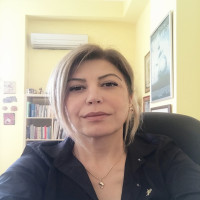
 Türkiye
Türkiye

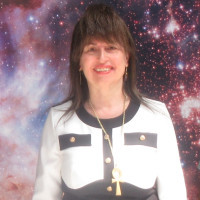
Alicia MARAVELIA: Although a recognized Egyptologist (PhD in the University of Limoges, 2004) and Astrophysicist (PhD in the University of Athens, 1997), with an initial BSc in Physics (University of Thessaloniki, 1988), Founder and Director of the Hellenic Institute of Egyptology, Co-Ordinator of 4 Research Projects and prolific author of more than 150 papers, books and reviews, she is also very fond of Music and the History of Music. She has studied Byzantine Music in Thessaloniki and Athens and wrote a book of Propria (Akolouthia) to honor the memory of Saint Alice/Alexandra of Russia (the Passion-Bearer). She specializes in the enharmonion genos of the Oktoechos and is very interested in the relations and interactions of the Arabic and Ottoman Maqam with the various modes (echoi) of Byzantine Music. The Hellenic Institute of Egyptology is a Research and Educational Institute, based on the principles of Humanism, Interdisciplinarity and International Synergies.
Christoforos Arampatzis is an archaeologist and museologist, employed by the Greek Ministry of Culture. He studied archaeology and museology in Greece and Switzerland. He has co-organized workshops and sessions about prehistoric lakeside settlements and the Neolithic period in Southeastern Europe. He co-edited a volume on Neolithic hunting and fishing and published papers on prehistoric bone tool industries and ornaments in edited volumes and journals.
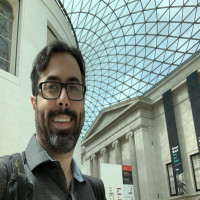
PhD in Archaeology from the Museum of Archaeology and Ethnology of the University of São Paulo (2016) with an exchange period at the Department of Archaeology of the University of Durham, UK, England (2014). Teixeira-Bastos also has a PhD in Archaeology and Middle Eastern Cultures from the School of Jewish Studies at Tel Aviv University, IL, Israel (2023). Master's degree in Archaeology from MAE-USP (2011), with an exchange period at Tel Aviv University (2010). I graduated in History from the Federal University of Rio Grande (FURG, 2005). Post-doctorate in Archaeometry at MAE-USP (2019). Post-doctorate in Anthropology at Stanford University, USA, United States (2020). Post-doctorate in History (Culture, Historiography and Heritage) at UNESP-Assis (2022). He is a member of the Scientific Committee of Computer Applications and Quantitative Methods in Archaeology - CAA International Scientific Committee (CAA-ScC, 2021-). Member of the Editorial Board of the American Anthropologist, a scientific journal of the American Anthropological Association, United States (AAA, 2021-). Teixeira-Bastos is also a member of the excavation teams of the archaeological sites of Apollonia-Arsuf (Tel Aviv University, Israel) and Tell Iztabba / Beit She'an (Münster University, Germany). He is the coordinator of the Laboratory of Archaeology and Anthropology of the Middle Eastern Populations, LAPOMED-USP, sponsored by FAPESP (2023/00172-8), at the School of Philosophy, Letters and Human Sciences of the University of São Paulo (FFLCH-USP).
 Italy
Web
Italy
Web
Lee Fratantuono is a classical philologist and ancient historian. He has published extensively on the poet Virgil, as well as on a wide range of topics in classical literature and Roman history.
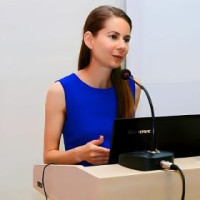

Claudia Barros has a degree in Archaeology from the University of Minho, and in 2021 she completed her Master's degree in the same institution, with the dissertation "The Look of Gomes Eanes de Zurara on the North of Morocco: study of the landscape of Alcácer Ceguer (Ksar Sghir)". Member of CEHUM-NETCult and ARCE - American Research Center in Egypt. Delegate and research writer of Asociación Galega de Exiptoloxía (Pontevedra, Spain). PhD student in Cultural Sciences, preparing a research study on the Amarna Letters and attacks of the Hapiru in the Egyptian cities of Levant region.
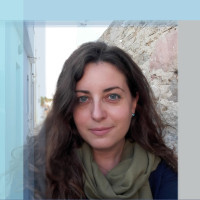
Alexandra Pentoti is a PhD classical archaeologist from Athens, Greece, currently employed at the Hellenic Ministry of Culture. Her research interests are focused on the archaeology of Early Iron Age Greece; Geometric and Archaic periods; Greek sanctuaries and cults; ritual practices; ancient myth and religion; and epic poetry. Her doctoral thesis, “Storage practices in the societies of the early historical times: Ritual and cult elements,” examines the role of storage in Early Iron Age ritual and cult activities in Central and Southern Greece, with an emphasis on the residences of local political-religious rulers, public and communal shrines and temples, and fertility and chthonic cults.
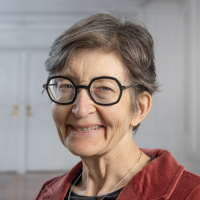
Barbara Crostini is Senior Lecturer in Church History, Art History and Cultural Studies at the Newman Institute, Uppsala, and Adjunct Lecturer in Greek at the Department of Linguistics and Philology in Uppsala University. She is ranked Assistant Professor in History of Religions, History of the Book, and Greek Philology by the Italian Ministero per l’Università e la Ricerca (MUR). She has edited several collections of essays, among which are Syrian Stylites: Rereadings and Recastings of Late Ancient Superheroes, co-edited with Christian Høgel, Transactions of the Swedish Research Institute in Istanbul, 26 (Istanbul: Swedish Research Institute, 2024); Why We Sing: Music, Word and Liturgy in Early Christianity, in Honour of Anders Ekenberg, co-edited with Carl-Johan Berglund and James Kelhoffer (Leiden: Brill, 2023); Receptions of the Bible in Byzantium: Texts, Manuscripts, and Their Readers, co-edited with Reinhart Ceulemans, Studia Byzantina Upsaliensia 20 (Uppsala: Acta Universitatis Upsaliensis, 2021). Her interests range from Late Antiquity to the Byzantine Middle Ages and her publications focus on both texts and material culture, especially on Greek illuminated Psalter manuscripts. She is currently working on a book about Dura Europos as a theatrical city.
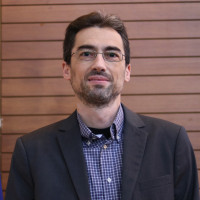
Manolis Manoledakis is Professor of Classical Archaeology at the International Hellenic University in Thessaloniki. He has also taught at the University of Ioannina, the Democritus University of Thrace and the Hellenic Open University. He has participated in various research programmes and is the director of the International Hellenic University’s excavation in Neo Rysio, Thessaloniki. His research work and teaching activity concentrate on the archaeology and ancient history of the Black Sea as well as central Macedonia, the ancient topography and geography of these areas, ancient Greek religion, Greek mythology in its historical context, and ancient Greek painting and vase-painting. He is the director of the two post-graduate programmes of the International Hellenic University’s School of Humanities, Social Sciences and Economics, the MA in Black Sea and Eastern Mediterranean Studies and the MA in the Classical Archaeology and the Ancient History of Macedonia.
Section editor
Prof. Dr. Paolo Di Benedetto is Teaching Assistant in Ancient History and holds a PhD in Ancient Greek History achieved at University of Basilicata, with a thesis entitled ‘Foundation Accounts of Aeolian cities in Asia Minor’. Subject expert in SSD L-ANT/02 (Greek History and Epigraphy), L-ANT/03 (Roman History) and L-FIL-LET/02 (Classical Philology), his research interests are traditions and foundation myths (archaiologiai) of the Ionian and Aeolian cities of Asia; traditions and accounts of Aeolian migration; political-institutional aspects and archaology of Aeolian Kyme and Mytilene in Archaic and Classical times; Representation and reconstruction of Aeolian borders in Archaic, Classical, Hellenistic and Roman times; identity, historical, geographical and institutional definition of Aeolian territory; relations between the Greeks of Asia and the frontier Greeks, as well as with non-Greek populations (Lydians, Persians, Carians); reconstruction of the evanescent Aeolian League; traditions on the Pelasgians and Amazons; historiography and rhetoric on commendation and the founding of cities in the imperial age; Memory Studies and the perception of identity in relation to the Ionian and Aeolian cities of Asia; Ethnicity and Intentionale Geschichte studies applied to the Aeolian world of Asia; fragmentary historiography (Hecataeus of Miletus, Ephorus of Cumae); archaeology of ancient Asia Minor; formation of the Roman province of Asia, with reference to the Aeolis of Asia. He is currently attending a second PhD in Historical Studies at the University of Naples ‘Federico II’, with a project on the Aeolis of Asia in the Roman Age.
Translated with DeepL.com (free version)
Anna Paule is a Bronze/Iron Age archaeologist from Linz, Austria (postdoc; independent researcher).
Her research interests are centred on the archaeology of the Near East, Cyprus, and Central Europe; long-distance contacts; gold jewellery and small finds, such as weighing tools; early (Neolithic) dairy farming; (solar) iconography; and clues for early astronomy. The latter includes the application of the Stellarium astronomy software. Anna Paule is the author of ten academic (peer-reviewed) articles. Five more articles are in print or accepted for publication (2024).
She graduated from the University of Salzburg, Austria, with a master’s degree with distinction in Classical Archaeology in 2007 (subject of the Master’s thesis: Roman equestrian statues). This was followed by doctoral studies at the Université Aix-Marseille I, Aix-en-Provence, France, where she graduated with a doctoral degree in Archaeology (PhD) with First Class honours in 2013 (subject of the Master’s thesis: gold jewellery from protohistoric Cyprus). After returning home, she passed a period of protracted illness but continued research on Cypriot and Near Eastern archaeology, with a special focus on gold jewellery, small finds, and ancient iconography (2013‒2018).
Research activities during this time as an independent researcher in Austria led to an employment at the University of Göttingen, Germany, where she supported the closure phase of a local research project on Bronze Age weighing instruments and gold jewellery (2018‒2020). This was followed by the Covid-19-break and another period as an independent researcher and job seeker in Austria. During this time, she focused on new research topics (e.g., dairy farming; archaeoastronomy) and developed an interdisciplinary approach to solar iconography and early evidence of solar astronomy, combining data obtained from traditional archaeological and natural scientific methods (astronomy software, etc.). The latter also made it possible to extend research into more recent history; e.g., the 18th century.
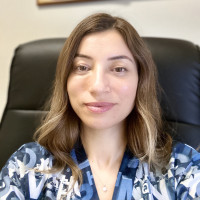

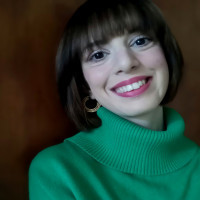
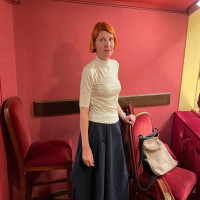
Marija Ljuština holds a Bachelor, Master, and Doctoral degrees from the Department of Archaeology, University of Belgrade - Faculty of Philosophy, where she is permanently employed since 2000. As an Associate Professor at the Department of Archaeology, she is engaged both in courses on later prehistory of Europe, and in individual mentorships. She was a guest lecturer at the University of Cambridge (UK), the University of Primorska in Koper (Slovenia), and the University of Rzeszów in Poland. Her research is focused on settlements and material culture of late prehistory in South-eastern Europe, as well as burial practices during the Bronze and Iron Ages. She was engaged as a research associate in systematic and rescue excavations of the following sites in Serbia: Petrovaradin Fortress, Baranda, Čučuge near Ub, Čelarevo, Dubac in Jančići, Židovar in Orešac (co-head of research). She has authored a number of papers published both in domestic and international journals, as well as within monographic publications regarding the Bronze and Iron Age of South-eastern Europe. She was a member of several research projects funded by the Ministry of Education, Science and Technological Development of Serbia and the international project Iron Age Female Identities in Southern Carpathian Basin FEMINE, financed by the Croatian Science Foundation. Currently she is a researcher of Interactions-Transmission-Transformation: Long-distance connections in Copper and Bronze Age of the Central Balkans – The FLOW project, funded by the Science Fund of the Republic of Serbia. Her results are presented at international scientific conferences in Serbia, Croatia, Slovenia, Romania, Bulgaria, Austria and Germany. She is a member of the International Union of Prehistoric and Protohistoric Sciences (UISPP), Serbian Archaeological Society, and Matica Srpska, and a holder of a scholarship from the Tokyo Foundation.
born in Venice 8.11.1952 Graduate at the University of Venice, Faculty of Humanities
1975-1976: post-graduate fellowship at the Istituto Italiano per gli Studi Storici, Naples
1978-1981: fellowship of the Consiglio Nazionale delle Ricerche 1981-1987: Researcher of Ancient History at the University of Venice, Faculty of Humanities Since 1992-: Alexander von Humboldt-Stiftung research fellow, at different times, at the Universities of Cologne, Aachen, Freiburg im Breisgau, and Heidelberg
1993: invited professor at the École Normale Supérieure (Paris) 1987-1995: associate professor of Greek History at the University of Trento 1995-2002: associate professor of Greek History at the University of Verona 2002-: Full professor of Roman History at the University of Verona 2007: invited professor (“director of the studies”) at the École Pratique des Hautes Études – Ve section des sciences religieuses (Paris)
2008-2010 President of the Courses of Cultural Heritage at the University of Verona
2012-2023 vice-president of the Società Italiana di Storia delle Religioni
2011- president of the Courses of Cultural Heritage at the University of Verona
2017 coordinator of the international Doctorate (Verona Gent) in Arts and Archaeology
2015 - Erasmus delegate of the Dept Culture e Civiltà
2005-2014 Director of the archaeological excavations at Grumentum (Lucania)
2016-2023 Director of the archaeological excavations at Tarquinia
2017- member of the editorial board of Acta Antiqua
2018- member of the editorial board of Diritto e Storia
Actual position: retired
Gregori Gian Luca: Dal 2003 professore ordinario di Antichità e Istituzioni Romane in Sapienza. Socio di varie Accademie. I suoi principali interessi di ricerca sono: Gli spettacoli nell'Occidente romano. L’Edizione di iscrizioni di Roma e dell’Italia. La Prosopografia e la storia sociale ed ammnistrativa dell’Italia romana. I Processi di romanizzazione, acculturazione e produzione epigrafica nell’Italia romana. La Falsificazioni epigrafica.


